A three-year criminal conspiracy investigation into the swapping and closing of newspapers by Postmedia and Torstar was quietly shelved early last month. Legal experts say the Competition Bureau, Canada’s antitrust law enforcement branch, missed a chance to hone its legal weapons against monopolistic practices when it folded its case without bringing it to the courts.
But the bar is set very high to convict anyone of violating the Competition Act — just how high made clear by recently unsealed documents examined by The Tyee.
The documents from the investigation made public Feb. 11 indicate Postmedia and Torstar each knew that the other would simultaneously close swapped newspapers. In emails, executives at Torstar referenced discussions with Postmedia on “who will terminate whose staff” and which would make “closure announcements.” To date, only descriptions of the documents by a Competition Bureau lawyer were unsealed to the public.
The Competition Act says it is a criminal offence if a person “conspires, agrees or arranges” to “allocate sales, territories, customers or markets” with a competitor to “lessen or eliminate the production or supply of the product.” Penalties include a fine of up to $25 million and a prison term of up to 14 years.
The court can render a guilty verdict even from circumstantial evidence but violation of the act “must be proved beyond a reasonable doubt."
According to one academic analysis, the Postmedia–Torstar deal “effectively divided the province of Ontario into two zones of mutual exclusivity, or regional monopolies.”
On Jan. 7, the Competition Bureau announced it decided not to bring its case to court.
Swapped and shut
After Postmedia and Torstar exchanged 41 newspapers and immediately closed all but six in November 2017, the Competition Bureau made headlines when it raided the companies’ offices for evidence, and later when it ordered company executives to testify under oath.
In the deal, Torstar and Postmedia swapped newspapers in markets across the country where they both owned publications. Once the companies owned both newspapers in the respective markets, nearly all of the papers that changed hands were immediately closed and staff let go, leaving behind only one newspaper in most of the markets.
Emails gathered by the Competition Bureau in its effort to compel testimony from Torstar and Postmedia executives show members of the companies discussed in advance who would bear responsibility for firing employees and announcing the closure of newspapers.
Soon after the closures, the top executive of Postmedia told media that neither side knew the other would close the publications.
“CEO says he didn't know Torstar was going to cut papers as well,” said a BNN Bloomberg headline featuring a video of then Postmedia CEO Paul Godfrey. Godfrey repeatedly states in the video that Postmedia only learned of Torstar’s plans, which included immediate closures, after the deal was completed. He would repeat the claim to the CBC and Globe and Mail.
But Dana Robbins, then a vice-president at Torstar subsidiary Metroland, wrote three weeks prior to the swap a newly released email that references closures and terminations.
“No decision has been made on who will terminate whose staff,” wrote Robbins, while describing properties that would move from Postmedia to Torstar. “Metroland's hope is that each company will terminate their own employees, but Post [sic] has not agreed to that yet,” Robbins continued, referring to Postmedia.
“If they do agree, that means we would essentially not be responsible for any termination/closure announcements in Simcoe as that would become Post's responsibility,” said Robbins, referring to Simcoe County in Ontario, where newspapers in Orillia, Barrie, Collingwood, Bradford and Innisfil were sold by Postmedia to Torstar and closed.
Robbins, in documents seized by the bureau, was identified as responsible at Torstar for key parts of the newspaper swap project, code-named “Lebron” internally.
As the shuffle occurred, John Hammill, Postmedia’s regional sales manager for Ontario newspapers in Simcoe County, was among those out of a job. He was terminated by Postmedia even though Torstar was the new owner, a fact that caused him to share documents and report what happened to the Competition Bureau. Though several others had made reports, whistleblower Hammill was the only employee willing to go on record.
A letter of intent from Postmedia to Torstar in the released cache of documents speaks of non-compete agreements the companies signed, assuring neither company would introduce a publication in areas they were abandoning.
The July 18, 2017 letter confirms the companies’ “definitive agreement” will include a five-year non-competition “covenant” in the markets where it exchanged properties. Competition Bureau lawyer Pierre-Yves Guay wrote in an affidavit accompanying the court files that the final non-compete agreement — not released to the public — included promises not to operate news publications targeted at particular audiences or distribute flyers in specific geographic areas.
When, after two years without updates, the bureau revealed it would not bring the case to the courts, the news vied with coverage on the U.S. Capitol insurrection one day prior. “The Bureau concluded that no further action was warranted,” said the Jan. 7 announcement.
“The Bureau must find clear evidence demonstrating that competitors reached an agreement to fix prices” or “allocate markets,” said the announcement, which offered no further explanation of why the case fell short.
Competition lawyer Mark Warner criticized the bureau’s decision not to bring the case to court. “The thing is that you also lose every case you are too afraid to prosecute,” wrote Warner in a tweet reacting to the news of the Competition Bureau dropping the investigation.
“The [@CompBureau] says it must find clear evidence of a price-fixing agreement or a deal to reduce the supply of a product or service before it can recommend prosecuting a case of criminal conspiracy.” - the thing is that you also lose every case you are too afraid to prosecute https://t.co/IrPx8w4r3W
— Mark Warner (@MAAWLAW) January 7, 2021
The bureau’s decision fits a pattern in Canada, Warner told The Tyee. Not bringing cases to the courts means there is little competition case law established in the country, he says.
Why should Competition Bureau investigators be “making a case about why they shouldn’t make a case?” said Warner. “I just happen to think that in other jurisdictions — and I've practiced in Brussels, in New York and Washington — people would investigate and bring the case.”
Warner says that if cases can’t be prosecuted under the criminal conspiracy provisions of the Competition Act which have a much higher standard of evidence, the bureau can change course and make use of civil prosecution provisions, which it did not do and often doesn’t.
Even civil court challenges to mergers are rarely successful. But Warner says when the Competition Bureau folds a case it makes a decision better left to the courts. “You’ve kind of turned the commissioner into both the prosecutor and the judge when you do that,” said Warner.
The move to drop the investigation also disappointed Dwayne Winseck, a professor at Carleton’s School of Journalism and Communication. “Early on, it seemed like maybe they're going to finally swing into action,” he told The Tyee.
Winseck has directed the Canadian Media Concentration Research Project, whose 2020 report noted that the Postmedia–Torstar newspaper swap “effectively divided the province of Ontario into two zones of mutual exclusivity, or regional monopolies.”
When reviewing a merger, the Competition Bureau can require that companies keep newly acquired assets separate so that deals can be reversed if they are deemed harmful to competition.
But the speed with which Postmedia and Torstar moved to swap and then shut down papers made the bureau’s job harder, said Michael Osborne, a partner at Cassels Brock law firm specializing in competition law and former editor of Canadian Competition Law Review. By closing the firms immediately, Osborne told The Tyee in 2018, Torstar and Postmedia made typical merger remedies under civil prosecution more difficult.
The Competition Bureau opted instead for a criminal investigation.
Osborne’s analysis involved a turn of phrase used by competition lawyers that you can’t “unscramble the eggs” once companies have combined and traded businesses. In that line of thinking, civil prosecution might not be able to remedy a case where Torstar and Postmedia immediately closed publications after their sale to each other, especially years after the transaction.
There is no requirement to keep assets separate when the Competition Bureau is pursuing criminal conspiracy charges, noted Michael Osborne back in 2018 when the bureau ceased looking at merger provisions.
“They can start scrambling the eggs right away,” said Osborne.
But the assumption that undoing mergers is dauntingly difficult has changed recently, outside of Canada at least, says Warner. Antitrust lawyers assembling cases against tech and social media platforms in the U.S. and EU are saying “yes, you can unscramble the eggs,” says Warner. Let the companies figure out how they will do it themselves, he says.
Newly released emails show that Torstar subsidiary Metroland director of finance George Christoforou was concerned that the companies may be forced to keep newspapers open.
“I need to determine our exposure if we are not ‘allowed’ to close publications right away if/when the Lebron deal closes,” wrote Christoforou in September 2017.
In response, Metroland’s director of business administration Sandy Pare then sent a spreadsheet of costs provided by Postmedia which apply if the company “had to keep all Niagara papers open for a year,” wrote Pare.
Torstar initially planned to close the newspapers days after the exchanges took place, released emails reveal. But the company quickly changed plans, an email from Dana Robbins details.
“This is NO LONGER the plan. All papers will now be closed on the same day as the announcement (Friday, Nov. 24.),” wrote Robbins.
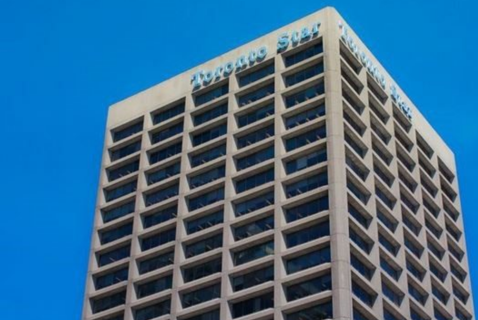
With the Competition Bureau’s investigation closed, Postmedia and Torstar face no criminal charges or any other legal challenges to the 2017 swap.
Competition Bureau commissioner Matthew Boswell told The Tyee in October that he understands if some Canadians are cynical about whether his agency has the muscle and mandate to ensure companies don’t get away with anti-competitive practices. He conceded that Canada has a history of encouraging market consolidation in its laws he must operate under, designed for an old view of Canada as a resource exporter.
“I totally get it. I’m not known as a patient guy myself,” said Boswell, of the long processes and secrecy due to confidentiality laws required of the bureau in its investigations.
“The standard of evidence is very high, and the role of the bureau is to investigate and present to the Crown attorney, which must prove things beyond a reasonable doubt. It can be very challenging,” said Boswell.
Battle over sealed documents
The saga of the legal probe into the Postmedia–Torstar newspaper swap includes a fight over what evidence should be made public. The court finally ruled releasing documents gathered in the Competition Bureau’s investigation was in the public’s interest last October, two years after Torstar applied to have them sealed.
Under the Charter of Rights and Freedoms, such files are usually made public, but Torstar argued in court that the files should be kept secret. A Superior Court judge agreed to seal the files until a hearing could be held.
The judge renewed that December 2018 temporary seal order three times before finally ordering Torstar to place redacted versions into public files.
The Competition Bureau contested the sections Torstar proposed to black out of the files, but ceased disputing the redactions in October 2020, when Torstar says it placed them in the public record.
The files were not actually put into public files until Feb. 11 of this year, senior client services representative Jocelyn Gouthro at the Ontario Superior Court told The Tyee.
In order to finally obtain the files, The Tyee had to independently obtain a copy of the court seal order and engage in weeks of exchanges with the Ontario Superior Court, in consultation with the Competition Bureau.
Competition Bureau spokesperson Marcus Callaghan said he understood an “administrative issue” explains why files were not actually made available until Feb 11.
The Competition Bureau, keying off seized evidence, served orders on Nov. 22, 2018 for executives of Postmedia and Torstar to appear for questioning within 120 days. But the Ontario Superior Court allowed the deadline to be pushed back several times until Dec. 31, 2020, a year and a half later than the original deadline.
The public will never learn when the interviews did take place and what further evidence was unearthed in interviews, up to three years after the newspapers closed. All of the interviews remain completely confidential under Competition Act laws. But one week after the last of the postponed deadlines, the bureau made its announcement that no further action was warranted in the investigation. ![]()
Read more: Rights + Justice, Media



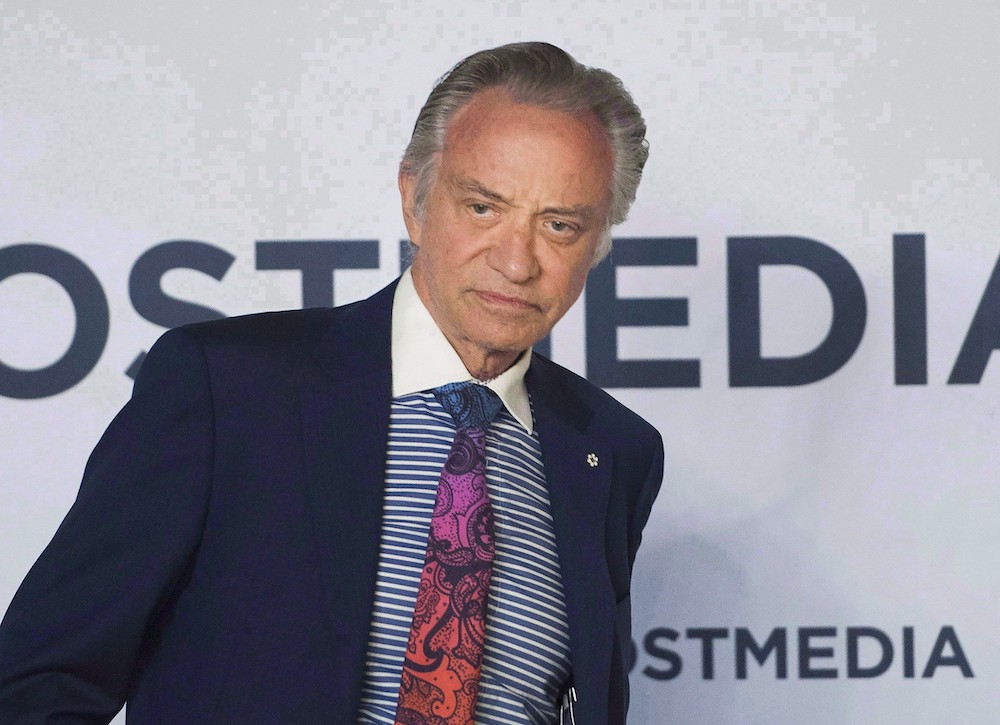
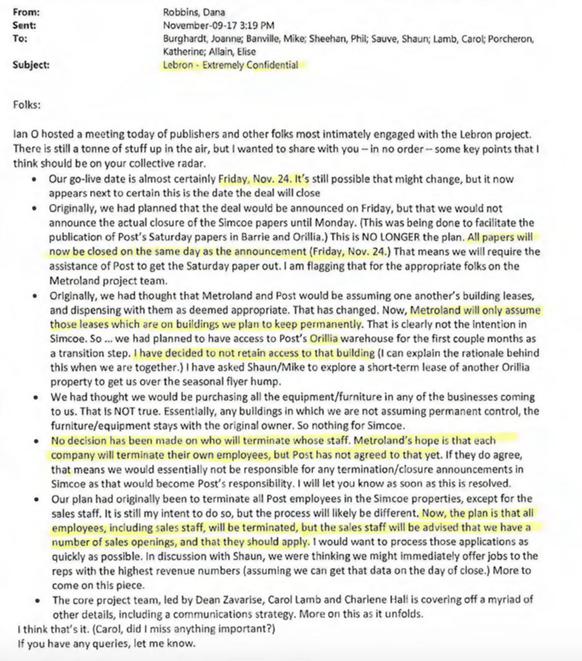
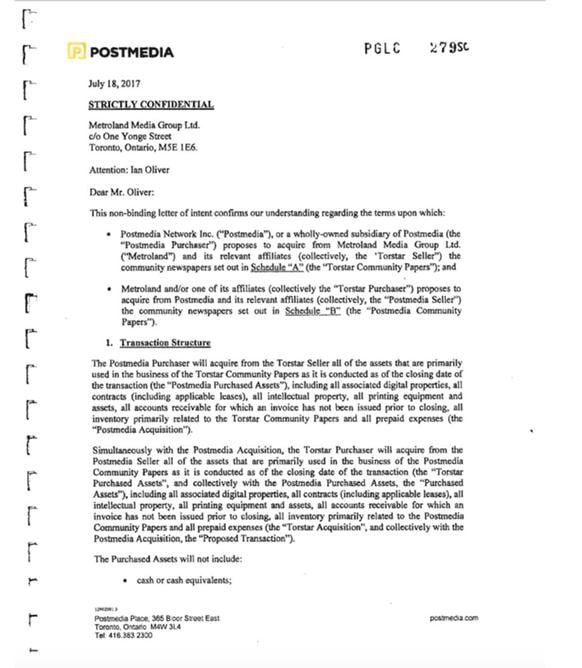
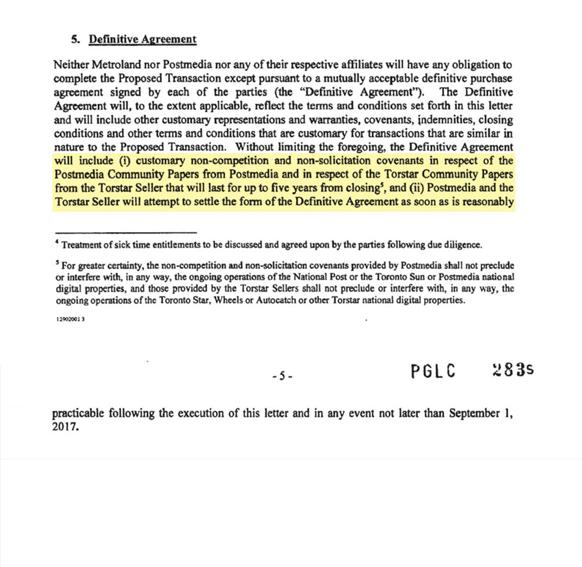
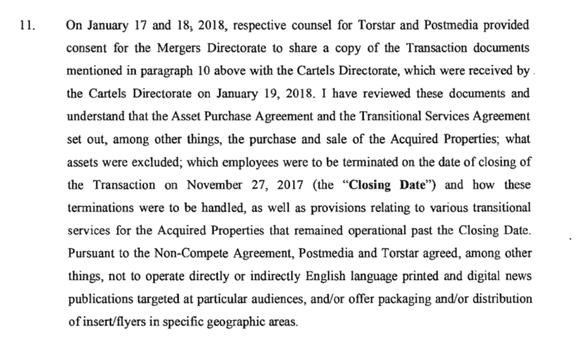
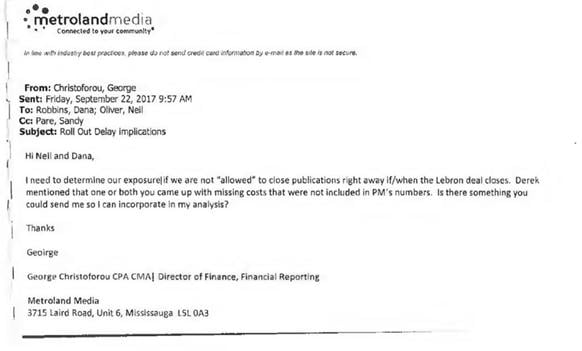












Tyee Commenting Guidelines
Comments that violate guidelines risk being deleted, and violations may result in a temporary or permanent user ban. Maintain the spirit of good conversation to stay in the discussion.
*Please note The Tyee is not a forum for spreading misinformation about COVID-19, denying its existence or minimizing its risk to public health.
Do:
Do not: